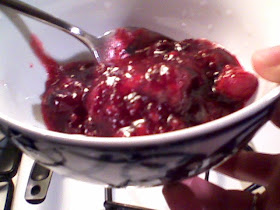I hope you aren't sick of hearing about my scone-periments. I wasn't totally nuts about my first scone attempt, so I decided to see what I could do about it. This time, they were really good, but still not as good as the ones at the coffee shop (or is it just the ambiance?). So, you may see a version 2.1 soon. As you will see, these are definitely not on my husband's diet.
Let me show you how I worked up an appetite for the scones:
 |
| running on slick roads like these is good for your glutes |
 |
| i think my phone takes good pictures of winter wonderlands |
 |
| this is our backyard; it's the view out our bedroom window. what does your backyard look like? |
In a big bowl, I threw:
2 sticks of butter almost frozen
1 c cream
1 c whole milk (the cream and milk are the only two problem ingredients because I don't usually have these)
4 1/4 c flour
2 t powder
1/2 t soda
1/4 t salt
1 c choc chips (I still wish I had bittersweet choc chunks but I didn't [read: my mom didn't])
Then I took a pastry cutter (aka "the tuna chopper") and chopped away just until all the butter pieces were marble-sized, but not any more, even though not all the flour was incorporated. As I said before, the over-kneading made too much gluten, which made the scones chewy (which isn't bad, but it wasn't what I was going for).
Then I took a piece of parchment paper and put it on a cookie sheet -- not a stone, because that spilled butter ALL over my oven and made my house smoky the next three times I baked -- and spread the dough out, flattening it with my hand as little as possible (the other option here would be to roll it out and keep doubling it over like croissant dough, but I was trying to duplicate the flakiness with less work [I know you're opposed to that]). Then I scored it with a knife (like I was cutting a pie). I read online that you shouldn't press the ends to make them square (it can interfere with the rising), so I left the edges ragged.
I baked it at 400 degrees for 20 minutes. As soon as the butter that was pooling around the edges started to get brown, I took them out. Last time the edges of the scone got brown and, while it was tasty, it wasn't what I was going for. The middle of the scone looked molten, and I was worried, but it actually firmed up just enough after it sat out for a few minutes (I guess this would depend on the thickness of your scone; mine was probably a little less than an inch thick in the center before I baked it). I also learned that scones rise vertically, but they don't spread out, so it's okay to bake them all squished together.
 |
| so we went on another voyage (this time they could sit on the seat because I didn't have a sooty cookie sheet) [cd for size reference] |
 |
| the way home: success! half gone! (Don't worry, husband, I'll eat the rest) |
So I hope this post is in the intellectual spirit of our blog: I made something. I wanted to make it better. I did research. I am sharing my findings. Now it's time for the audience to make them so we can have some peer reviews!
I moss you,
Tofu

















.jpg)



























